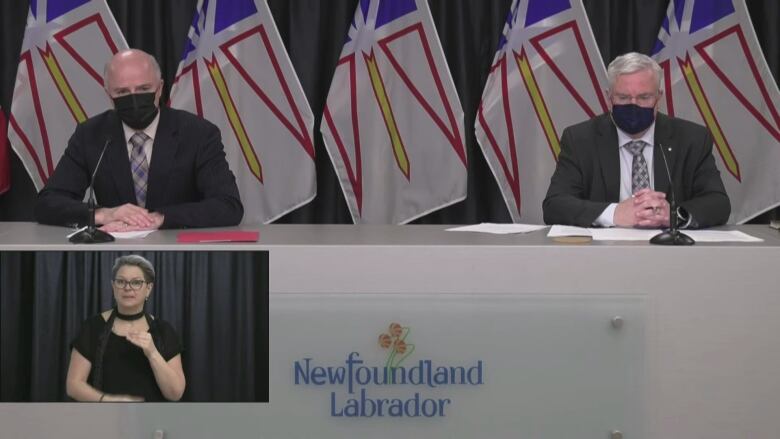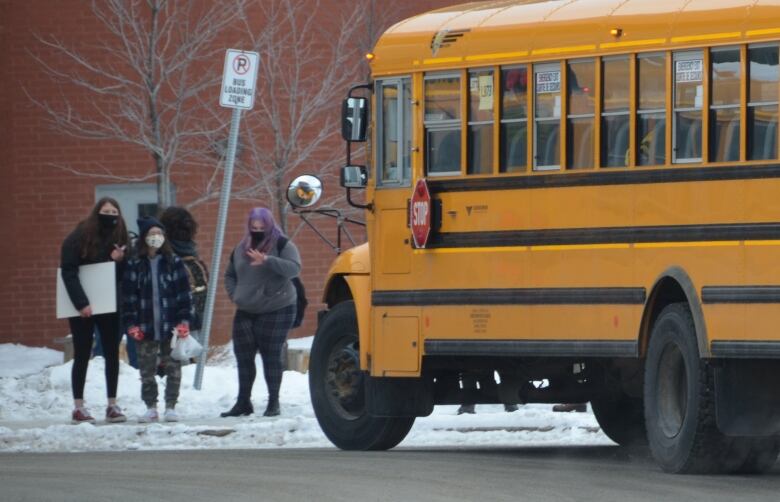50 schools outside Avalon to have some grades combine in-person classes and individual learning
Scenario 2 will have students alternate between in-class learning and work at home without instruction

While schools outside the Avalon are reopening, dozens of classes in those schools will not go back to full-time in-person classes, and instead, those students will have a combination of in-class and individualat-homelearning.
That's because some classes at some intermediate and high schools can't adhere to the updated health and safety protocols around cohorts and physical distancing.Students in those schools will alternate between in-class instruction and assigned work done at home without direct instruction from a teacher.
In total, 28 schools in central Newfoundland, 20 schools in western Newfoundland, and two schools in Labrador will have some grade levels that have a mix of in-class and at-home learning, otherwise known as Scenario 2,starting Wednesday.
The full list of schools and affected grades can be found here.
Scenario 1, which is in-person classes only, is in effect for most of the schools in those regions, starting Wednesday.
Education Minister Tom Osborne and Newfoundland and Labrador English School District CEO Tony Stack shared the information at a media briefing Friday afternoon, after it was announced thatmuch of the province would move intoAlert Level 4.
Alternating days for studentsin Scenario 2
About 50 per cent of students in Scenario 2 will be attending class at any one time, said Stack.
"You follow your regular schedule and then you attend on alternating days," he said.
"How that breaks down in practicality is Monday, Wednesday, Friday for one group and then that group the next week go to school on Tuesday and Thursday."
Stack said teachers will assign work, readings, assignments, which is to be done on the days when students are not at school. There will be no direct online instruction for students on days they are not in school.
"Essentially, on alternating days the students, who are now more mature students in the high school setting will have that day to prepare for the next day, to catch up on the assignments," Stack said.
"It's not ideal, but it's basically 50 per cent of your time attending school as you normally would."

He said students with complex needs would still attend school full time in Scenario 2.
There will be no additional safety measures on buses, but Osborne said the Scenario 2 arrangement will result in fewer children on buses and more room for physical distancing.
Stack said students have done well to follow thecurrent rules while on the bus.
Online learning will continue for students outside the Avalon Peninsula on Monday and Tuesday, said Stack, but students canexpect lighter schedules on those days as teachers prepare to move to either Scenario 1 or 2.
New mask rules
There are new guidelines for wearing masks and other protective equipment.
All school staff have to wear a disposable, non-surgical, three-ply mask and face shield at all times when in the classroom and when two-metre physical distancing cannot be maintained.
Osborne said teachers and staff will be provided with the necessary masks and face shields, and both the English and French districts are shipping them to schools.
Students in grades 4 to 6 have to wear a mask while seated in class and on the school bus.
Students in kindergarten through Grade 3 are expected to wear a mask at all times on the school bus and are encouraged, but not required, to wear a mask during the school day.
Students can take off the mask when they're eating or taking part in physical education classes.
Stack saidwith a more contagious coronavirus variant now in the province, it'scritical to adhere to maskregulations, and he expects moststudents will have no issue wearing one.
With the additional protocols that are put in place, I believe that our schools are as safe as they can be.- Tom Osborne
Online learning will continue for schools and post-secondary institutions on the Avalon.
The minister said the decision to keep classes online on the Avalon will be re-evaluated in two weeks.
Some concern for teachers
In a media release, the Newfoundland and Labrador Teachers' Association said while Friday's announcement is a step in the right direction, they still havesome concerns.
"We welcome the announcement today that some public health measures for schools will be strengthened across the province as regions outside the Avalon move to Alert Level 4," NLTA president Dean Ingram said in the statement.
"However, we still have concerns about the ability of many schools to maintain effective student cohorting and the continued challenges they will face with respect to proper physical distancing and poor ventilation."
Both Osborne and Stack said Newfoundland and Labrador has been in an enviable position with its handling of the COVID-19 pandemic and good guidance will get the province through this most recent outbreak.
"I trust the guidance of public health and our chief medical officer of health. It's been proven," Osborne said.
"With the additional protocols that are put in place, I believe that our schools are as safe as they can be and our early learning and child-care centres are as safe as they can be."












_(720p).jpg)


 OFFICIAL HD MUSIC VIDEO.jpg)
.jpg)



























































































